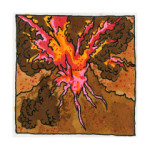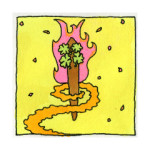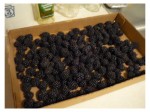It’s all about farm games.
K and I break out the tea collection and get busy organizing the life support system module number tea-oh-yeah. My friend Snow would be modestly and politely moved by our devotion, as so Level 3 it is to her Level twenty-four forward-slash seven, know what I’m sayin’?
Side note: I mean it. When you’re that level, you are big dudette generous and make it look easy. “Here, have everything you need to start. Here’s a location on a map. Get adventurin’ and maybe you’ll connect with ultra-power tea-ness your own special way.”
Back to K and I. We’ve bought a number of glass milk jars from the local upper-cruster Whole Foods. Plastic caps, but what the hey weeds have to make do with what they have right? While we do have tea bags, our focus is on resealable containers of loose-leaves for mix and match. Since I’m a honey-freak, I have my honey in the rough for getting my freak on.
Now K is pretty crafty. We get tired of boiling the water the usual way, so she investigates a location on the map and we find ourselves with the bonus round—an electric teapot that rapid-boils water in less than five minutes. Just fill with water, plug in, flip the switch, and pow. Yes, this is very much dependency on instrumentality (not to mention electricity), but as I said this is the approach of the lightning age (which is very aquarian).
So now we can make large quantities of water for brewing tea. When it’s cool we fill the jars and put them in the fridge. Goodbye, buying high priced tea in the store! I’m also a soda-fiend, so anything that alleviates my vice for soda varieties is good. Water’s too boring for me, juice too strong, milk too bland and coffee too strong. Tea gives me the watery goodness, and a flavor, so I can drink lots of it and not burn out.
Special bonus: I tell Snow about this amazing teapot and she’s floored. I give her the info hookup and I get the feeling she teleports one to her kitchen while I’m standing there talking to her. Next week I run into her again and she tells me the thing opened up a new level for her in the tea-realm, allowing her to adventure in a new area.
The teacher shares what they know and maybe it’ll pay off in those hidden rooms you missed when you were fighting the tea ogre with squid tentacles back on level eleven. When you hold onto that hunger for knowledge, keep striving with joy for what you do, it pays off. Snow polishes that gemstone of a hankering she has a little more, while K and I get life support system bonus for more XP. That’s what generosity does for you.
So what does this have to do with farm games? Well, seems like on Facebook lately there’s been a surge in farming games. You socialize with your friends, care for each other’s farms, raise crops and harvest goodies. Mainly in the dungeon and dragons kind of reward cycle—you kill monsters so you can get better at killing monsters, only here it’s grow crops so you can get better at growing crops.
It’s a slight paradigm shift in games, I think, which bears careful watching. Is this the seed that falls in the right ground at the right time, the spark that kindles a new way of thinking that will grow grow grow?
The thing is, there’s a growing interest in resource management games (SimCity, the Sims, Civilization, and so on). The shoot-em-ups and the side-scrollers are still there. But now you have a growing awareness of “Hey, it’s fun to farm. To raise animals, plant corn, and build wells.”
Yes, the reality is hard work and thankless repetition. But it depends on how you look at the reward cycle. K and I are looking to be healthier and happier. This formula (of many) is about the reward of having something we make that keeps us going without resorting to the kiddie pool that is mainline industrial food production for loyal, stunned workers. For Snow it’s about a passion for the pursuit of what interests her.
Both operate under systems that farm games mimic to a degree. You look for stuff, gather stuff, make stuff, improve your skill with stuff, and then the stuff benefits you.
Then you get into complex games like Harvest Moon: Tree of Tranquility, where you need to have good relationships with people to get the stuff. There’s lots of stuff to master—mining stuff, cooking stuff, animal stuff, plant stuff, clothing stuff. You’re in the realm of a community and the need to ration your time to develop the stuff you need. The ultimate goal: To be the best “stuff” person you can be, in this case the archetype of the farmer who are their own means of production.
What does being a good farmer mean? That you can court a partner and raise a family (and the game allows you to do this, ending only when it is the next generation’s turn to find their fortune), and you can also save the world (or the world of this game anyway)—your knowledge as a farmer revives the Goddess of the land and brings blessings back to the community.
You got that? Your ability to beat things up here is worth zilch. Your ability to be patient, adaptable and friendly can save the world for everybody! Or allow you to have a happy home life—either as a farmer who just loves making bread for the Hek of it or as a family person moving things forward to the next spiral of that life that is greater than ours.
I’m living it a little, others are living it, and the games are representing it. What level is your watering can skill yo? Can you make perfect pickles? How’s that ability to make butter?
I’m wondering what the next signpost will be to what’s evolving right before our eyes. In the meantime, I need to get more and better skills, talk people up more, and get busy on the farm!
Because I think there’s a comprehensive picture here forming.
 Here is the PDX Gingerbread Witch Spider Cookie that I ate.
Here is the PDX Gingerbread Witch Spider Cookie that I ate.





